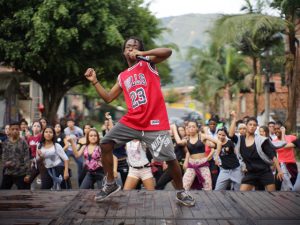
About the project
The Art of Peace is a major 3-year research project funded by Arts and Humanities Research Council (£1m) exploring the role of arts in four different situations of conflict to make peace.
“I fear we [peacebuilders] see ourselves to be – and have therefore become – more technicians than artists. By virtue of this shift of perception our approaches have become too cookie-cutter-like, too reliant on what proper technique suggests as a frame of reference, and as a result our processes are too rigid and fragile.”
JP Lederach, Peace Scholar.
International interventions aimed at building peace in conflict and post-conflict societies have a rather negative track-record in achieving their objectives. One of the main explanations for this is the apparent inability of international actors to reach out and connect with local communities and leaders who are key in transforming societies and enabling a lasting peace.
 In recent years, arts based approaches to peacebuilding have gained traction as an emerging area of research and practice typified by the work of Cynthia Cohen at Brandeis University and programmes delivered by NGOs Search for Common Ground and In Place of War and countless community projects. Despite these advances, arts based approaches to peacebuilding as an area of study and practice remains under researched. In particular, there is a deficit in understanding the impact community devised and led arts projects can have on peace formation at various stages of conflict amongst diverse actors. Thus, this project investigates the potential of grassroots led and devised arts projects in undertaking a key role in how peace emerges within a country and stresses the agency of local people to change their society. We aim to determine how arts can positively contribute to peace; this project builds a community of practice between academics, artists, practitioners and policy-actors to explore the transformative power of the creative arts in the context of conflict and peace. Creating an evidence-base around the impact of arts can shape new policies and NGO programming to improve the life of people in conflict-affected societies.
In recent years, arts based approaches to peacebuilding have gained traction as an emerging area of research and practice typified by the work of Cynthia Cohen at Brandeis University and programmes delivered by NGOs Search for Common Ground and In Place of War and countless community projects. Despite these advances, arts based approaches to peacebuilding as an area of study and practice remains under researched. In particular, there is a deficit in understanding the impact community devised and led arts projects can have on peace formation at various stages of conflict amongst diverse actors. Thus, this project investigates the potential of grassroots led and devised arts projects in undertaking a key role in how peace emerges within a country and stresses the agency of local people to change their society. We aim to determine how arts can positively contribute to peace; this project builds a community of practice between academics, artists, practitioners and policy-actors to explore the transformative power of the creative arts in the context of conflict and peace. Creating an evidence-base around the impact of arts can shape new policies and NGO programming to improve the life of people in conflict-affected societies.
To this end, we will develop a methodology to assess the impact of arts-based peace projects and their legacies. The project’s starting point is the simple notion that the nexus of aesthetic, cultural, and social engagement can be powerful and offers an ‘undercommons’ upon which to build peace. The project distinguishes between contexts of ‘war’, ‘diffuse war’, ‘transitions from war to peace’ and ‘post-war’ contexts to investigate the role that performative arts can play in each of these conflict stages. We will rely on the case studies of Syria, the Democratic Republic of Congo (DRC), Colombia and Bosnia- Herzegovina to analyse the complex interplay of the arts and war.
Comparing and contrasting these case studies in terms of where the arts are situated, who runs the arts projects and how they work best as a partner of peace formation, the project asks:
- What role can grassroots arts play in different types and stages of war?
- Based on these insights, under what conditions can the creative arts and peace formation processes be best integrated with each other?
- How can we understand the extent to which creative arts projects help external or internal norms of peace to be adopted on a broader social level, or do they highlight local norms?
The project will be run by the University of Manchester, Durham University, and In Place of War with the support of several local researchers and artists, combining insights from the field of academia with local arts practitioners on the ground. Project leads will form a partnership with local organisations and actors in each of the case countries to conduct the research and devise a toolkit for grassroots and NGO practitioners on the one hand, but also to co-produce art productions on the other. The latter include exhibitions, an audio archive, community performances and web-based content, all of which will be accessible to the communities in the countries themselves as well as to UK audiences.
